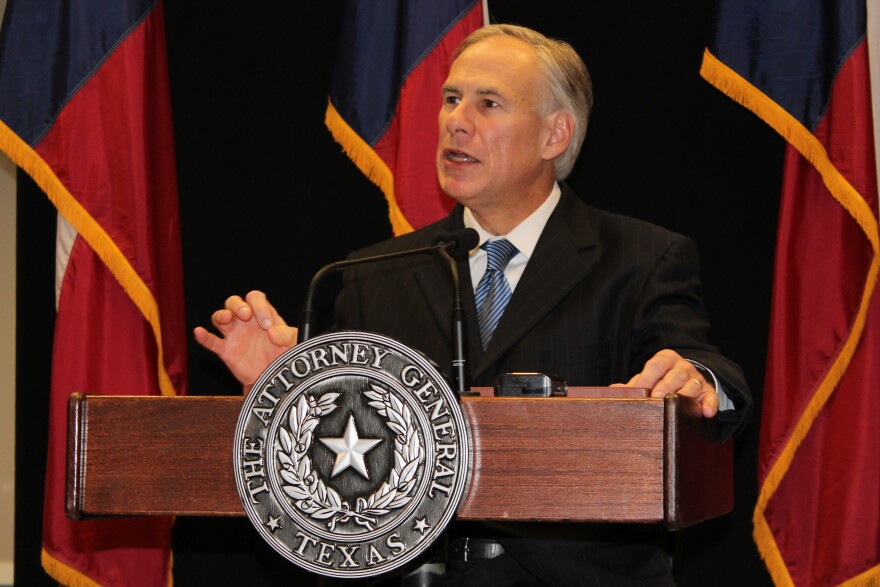Almost a year ago, Gov. Greg Abbott was cheered for asking the Texas Legislature to make ethics the signature issue of its 2015 session. Five months later, they sent back a bill he disliked enough to veto.
Now, he’s attempting another grand act of persuasion that will require him to improve his salesmanship. He wants to amend the U.S. Constitution.
The current generation of Texas Republicans has defined itself by its opposition to the powers that be in Washington. For 15 of the last 23 years, the nation’s voters have put Democrats in the White House. Texas, meanwhile, has had a Democrat in the Governor’s Mansion for only two of those years. It’s not just about party, though: The state’s leaders snarl at being on the collar end of a federal leash, no matter who’s in the White House.
That’s the sweeping backdrop for Abbott’s proposal to convene the states to amend the U.S. Constitution. The official reaction from his fellow Texas Republicans, as The Texas Tribune’s Edgar Walters reported, has been distressingly muted.
Abbott has to get the idea through his own statehouse, and then through 33 others, a task that will require persuasive abilities he hasn’t exhibited in his first year as governor. A success on something this big would give a leader a shot at the history books, a failure the stuff footnotes are made of.
The so-called ethics session of the Legislature is already on the governor’s political vita. Abbott suggested a few reforms during his campaign for governor, but during the legislative session he left the details to lawmakers, who blew it.
He presented his newest proposal to thunderous applause last week at the Texas Public Policy Foundation’s convention, but that audience would cheer him for a smile and a wave. If Abbott is going to have more success this time, he’ll have to be both persistent and clear about what he wants. If getting new law in place is the object, he’ll have to do some work.
Another way to put it: Would his initiative be considered a success only if the states assemble to talk about the Constitution? Or was the proposal itself the end result, issuing a report to a friendly audience that cheered, generated some headlines and then moved on to something else?
The answer depends on whom he can persuade to join the cause.
Abbott and others like him want to call a “Convention of States” to amend the Constitution. You’ll find that the proponents are touchy about words; they strongly object to calling this a “constitutional convention” — a term they use for a gathering that ditches the entire document and writes a new one.
The Texas governor isn’t the first to try this. So far, only Congress has successfully proposed amendments to the Constitution, but it’s not the only way to do it. Agitation from the states prompted Congress to approve the amendment for direct election of U.S. senators. Proposals to convene the states in support of a balanced budget amendment have been approved by 27 states.
The American Legislative Exchange Council — a conservative group of state legislators — has proposed a “model” version of the legislation required to apply for a convention of states. Another group called Citizens for Self Governance has been pressing for a gathering, too, according to Mike Ruthenberg, its executive vice president.
The model from Ruthenberg’s organization — mirrored by ALEC — would have states calling a convention “for the purpose of limiting the power and jurisdiction of the federal government.”
That has the advantage, he said, of limiting the topics under consideration: “Single subject, but not single issue.” Instead of just saying, for instance, that they want a balanced budget amendment, the states would apply for a more general subject that includes a balanced budget and other things, too.
According to Ruthenberg, it wouldn’t include subjects like abortion, civil rights, guns or same-sex marriage.
Four states have already passed such resolutions: Alabama, Alaska, Florida and Georgia, according to Ruthenberg. Another 12 states got it through one of their legislative houses, but not both. At one point, 37 states were concurrently considering resolutions for conventions to amend the U.S. Constitution.
That’s pretty interesting progress, but it is a long way from amending the Constitution.
The requirements are simple, but not easy.
Two-thirds of the states — 34 — have to apply for a convention and have to list the same reasons for it. Congress has no choice but to approve. If the states could get to a convention — this has been tried, but has never happened — they would have to agree on specific proposed amendments. Those, in turn, would have to be approved by the legislatures of at least three-fourths of the states; all but a dozen of the 50 states would have to go along.
Last year, legislators in the Texas House got a convention of states application out of committee but not to the full membership — and not to the Senate. To force a convention, that resolution would have to win the support of two-thirds of the members of both chambers and in the same form as applications from 33 other states. Last year’s Texas bill proposed a convention to “impose fiscal restraints on the federal government.”
Abbott has proposed a convention of states to debate nine constitutional amendments limiting the reach of the federal government and of executive agencies in particular, requiring a balanced budget and giving states power to overrule court rulings and federal laws.
The governor found out last year how hard it is to get Texas lawmakers to regulate their own behavior with ethics reform. His new project will show everybody how much he learned from that experience.
Disclosure: The Texas Public Policy Foundation has been a corporate sponsor of The Texas Tribune. A complete list of Tribune donors and sponsors can be viewed here.
This article originally appeared in The Texas Tribune at http://www.texastribune.org/2016/01/13/analysis-greg-abbotts-constitutional-changes-requi/.





